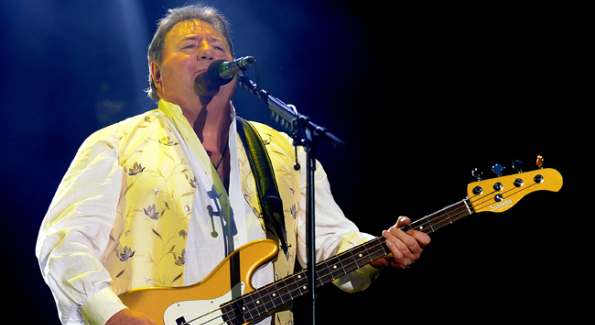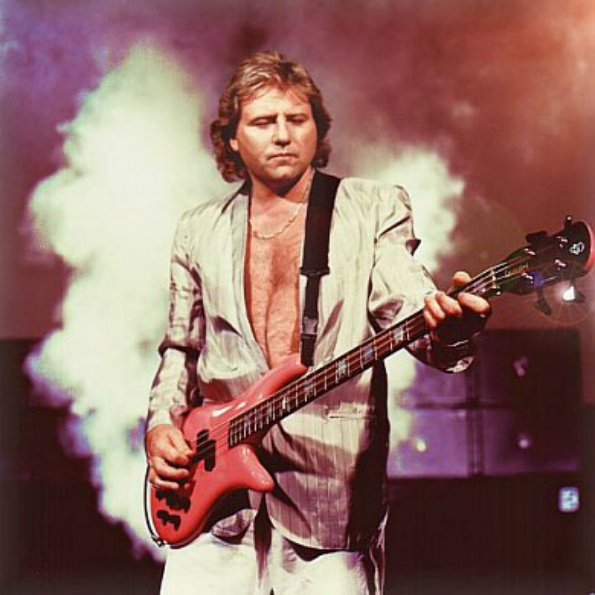1970s musician Greg Lake proves he can still rock on.
As Neil Young once sang, “It’s better to burn out, than to fade away.”
And Neil was dead on, the life and career of a rock and roll star always seems to take one of two paths. One is arguably the more common road: the rock star gets famous, then as they get older, and as they desperately cling to the lingering remnants of glory days past, the bygone aura they try to reproduce never measures up to what it once was. They can even slowly lose their chops and things begin to disintegrate, no one really cares, and they sadly fade away into oblivion. Sad, but all too true.
Or something special happens. The rock star stays dynamic and active into their later years, their chops remain intact and even improve, they find ways to positively collaborate with their equally legendary peers, they accept their place in rock history and embrace their legacy and actually capitalize on it, and their fans, well, they show that they really do care about the music. It’s rare, but it does happen.
That kind of rock star in scenario two is Greg Lake. To borrow from the most famous song he ever wrote as a member of prog rock gods Emerson, Lake and Palmer, oh what a lucky man Lake is, even forty-plus years after he began his illustrious career. During a recent long chat from London, the amicable and engaging 64-year-old Lake sounded vital, vibrant, excited and ready to go full speed ahead on his soon-to-begin “Songs Of A Lifetime” tour, which hits The Birchmere on April 24th and will joyously celebrate music from his King Crimson and ELP days while he also shares stories and anecdotes from his storied past.
“Part of the reason that I’m doing this,” Lake told me in his perfectly prototypical English rock star accent, “is that I’m just coming to the end of writing my autobiography, and I don’t want to be too high-minded about it but it’s the story of my life, and it’s been quite a remarkable life in a lot of ways. When I was writing all of this, as I was going through, I noticed certain songs would come up, and they were pivotal to my life and my career. And it occurred to me that all of these together would make an interesting concert. And it’s not just my songs, but songs that other people had written and recorded as well. And each song has a story attached to it. So that was the idea for the tour we’re calling ‘Songs Of A Lifetime.’”
Lake’s illustrious career remains one of rock’s most successfully long lasting even amidst some typical bumps in the road most rock and roll paths often contain. He met keyboardist Keith Emerson first in the early 70’s while in the groundbreaking prog rock ensemble King Crimson, and then shortly afterward, the pair was introduced to drummer Carl Palmer by legendary music impresario Robert Stigwood. Shortly after, in a simple London flat, ELP was born.
Why did bands like King Crimson and ELP take their sound in a new and largely uncharted progressive rock direction, rather than the more hard rock genre that many bands of the day had become successful at? Simple, really: to be different and get noticed.
“At that time, the currency in the music business was originality. You needed to be original and different to stand out. In those days if you were to play an album by any of the great artists of the time – Hendrix, the Rolling Stones, Pink Floyd, Jethro Tull, you name it – in three seconds of playing the record, you would know who you were listening to. They all had an identity and a personality. And King Crimson realized that we needed to be different… that was the real difference in how progressive rock music developed. It wasn’t using those same 12 bar formats, we were using the influence of classical music, which was many different things and had elements that were not at all related…It wasn’t one of the normal forms of rock music. And despite what some may think, it did have a huge influence on rock music in the latter part of the 20th century. People still write to me, people like the Red Hot Chili Peppers, they’re huge fans. “
From the beginning, the expectations for ELP were huge given the talent assembled. And the band lived up to those expectations from the start and kept their “Fanfare For The Common Man” going for a highly successful yet relatively short period of time. The place where ELP really broke into the stratosphere was the legendary Isle of Wight Festival in 1970, where a who’s who of the day gathered a year after Woodstock in one of rock and roll’s first true large festival settings. And ELP blew the massive crowd away and were on their way to superstardom.
“Anybody who was anybody was playing at that festival – The Who, Jimi, everybody. And we got up on the stage and it just went very, very well. There were three hundred thousand people who all stood up and it was undeniable. We realized that we cracked it when we walked off the stage. The next day, we were the front page of every newspaper you could imagine, we were world famous. It wasn’t that we’d come from nowhere all of a sudden, of course it wasn’t an overnight thing. We’d worked hard for years building up our careers with King Crimson and [Emerson’s band] The Nice, and eventually we ended up with ELP. And once we had exploded, it was only a couple of years until we were playing 60,000 seat stadiums.”
After a string of gold records and worldwide fame for ELP led to more huge crowds, including almost 200,000 at the big California Jam concert in 1974, tensions in the band largely due to a disagreement on the direction they would take caused ELP to take a two year hiatus even though they were enjoying immense popularity and financial success.
After recording the classic double LP Works Volume I and then embarking on what turned out to be an ill-fated and financially disastrous heavily orchestral tour, ELP broke up for the first time after their next album Love Beach was released. Lake grows a bit wistful when he talks about his wish back then that the band could have held it together amidst the growing discord.
“Personally,” Lake says, “I really would have liked to have continued and tried to face the challenge of finding a way to make another record in the same way as we had made Trilogy, Brain Salad Surgery, Tarkus. These albums were really fantasy records, and I personally never tire of making that sort of music.”
In subsequent years, Lake did a brief stint in the British supergroup Asia, recorded some well-received solo material and collaborated in the studio with some of his peers, and even reunited with Emerson for an album and tour as Emerson-Lake. Palmer joined his two former bandmates and the original lineup briefly regrouped in the early 90’s for two albums and a tour, but soon after, old issues arose and ELP dissolved again, returning one last time in 2010 with another final ELP appearance at a British festival and an unplugged Emerson-Lake tour following that as their swan song, at least for now.
In addition to the brief ELP & EL reunions, Lake’s life in the 21st century has been charmed, with highlights like playing in Ringo Starr’s All-Starr Band (“he’s such a great guy and that band was lovely”), recording with The Who (“that was a strange experience”) and jamming onstage with the Trans-Siberian Orchestra and Jethro Tull among others. He has also headlined benefits with Roger Daltrey and Robert Plant for the Teenage Cancer Trust.
Deep down, Greg Lake mostly appreciates just being on the planet, let alone being able to play his classic music for those who love it. And that kind of appreciation of life and music is something that comes through strikingly when talking to him, and is sure to come through on his upcoming “Songs Of A Lifetime” tour.
“I’m grateful to be alive. I value each day, highly. The older you get, the more you do. And now, it’s coming to the end of that career really, hopefully not too soon, but I know I won’t be able to play forever. I’m grateful for a fantastic career. But in the end, music is a spiritual thing…And if I lost that, I’d stop playing.“






